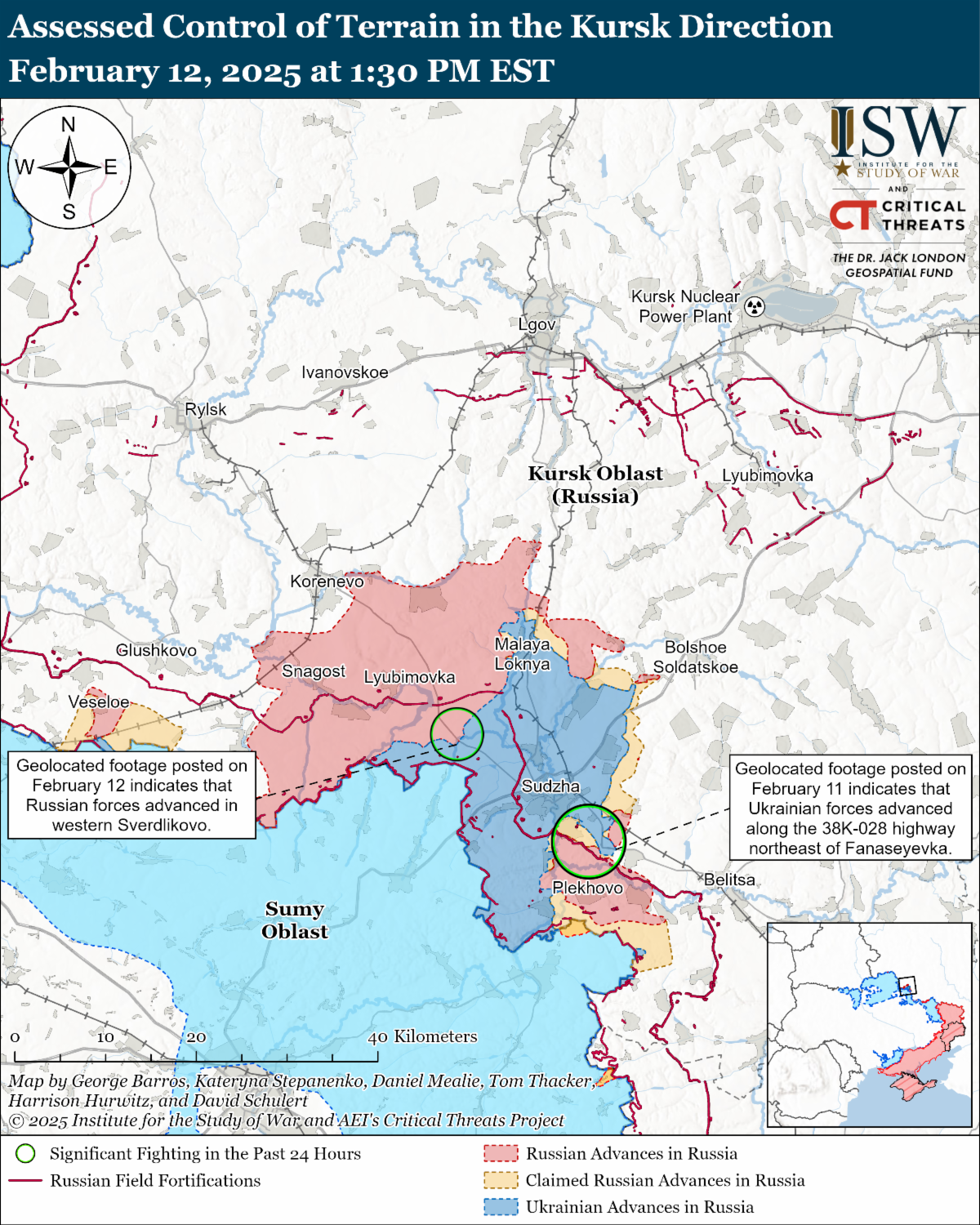US President Donald Trump held bilateral phone calls with Russian President Vladimir Putin and Ukrainian President Volodymyr Zelensky on February 12. Trump stated on February 12 that he discussed the war in Ukraine with Putin and that he and Putin agreed that their administrations will "immediately" begin negotiations. Trump added that he planned to "inform [Zelensky] of the conversation" after his call with Putin. The official Kremlin readout of the call claimed that Putin emphasized the need to "eliminate the root causes" of the war and that Putin "agreed with" Trump that "a long-term settlement could be achieved through peaceful negotiations." Russian officials have explicitly defined the "root causes" of the war as NATO's alleged violation of commitments not to advance eastward in areas near Russia's border, which indicates that the Kremlin remains committed to imposing its will and security interests on the United States and Europe and is not interested in compromising on this demand. Trump confirmed his phone call with Zelensky and stated that they discussed the war and the upcoming February 14 meeting between Zelensky and US Vice President JD Vance and Secretary of State Marco Rubio at the Munich Security Conference. Zelensky stated that he and Trump discussed opportunities to achieve peace, readiness to work together, and Ukraine's technological capabilities — including drones. Zelensky stated that Trump shared the details of his conversation with Putin and that he and Trump agreed to plan future bilateral meetings.
Kremlin Spokesperson Dmitry Peskov and Russian Security Council Deputy Chairperson Dmitry Medvedev explicitly rejected Ukrainian President Volodymyr Zelensky's proposal to trade occupied Ukrainian territory for territory held by Ukrainian forces in Kursk Oblast during future peace negotiations. Medvedev stated that it would be "nonsense" to swap Russian and Ukrainian territory, and Peskov stated that Russia will "never discuss" exchanging its territory. Medvedev's and Peskov's statements further support ISW's assessment that Russian President Vladimir Putin is uninterested in making any compromises during future peace negotiations and will only comply with a peace agreement that fulfills all of Putin's maximalist demands in Ukraine.
Key Takeaways:
- US President Donald Trump held bilateral phone calls with Russian President Vladimir Putin and Ukrainian President Volodymyr Zelensky on February 12.
- Kremlin Spokesperson Dmitry Peskov and Russian Security Council Deputy Chairperson Dmitry Medvedev explicitly rejected Ukrainian President Volodymyr Zelensky's proposal to trade occupied Ukrainian territory for territory held by Ukrainian forces in Kursk Oblast during future peace negotiations.
- Denmark's Defense Intelligence Service (DDIS) assessed that Russia may have the capabilities to launch a full-scale war against NATO in the next five years, which is consistent with ISW's assessments about Russian efforts to restructure and prepare its military and society for a future conflict with NATO in the medium to long-term.
- The Ukrainian Ministry of Defense (MoD) recently launched the "Contract 18-24" voluntary recruitment program aimed a recruiting 18 to 24-year-old Ukrainians into the Ukrainian Armed Forces.
- Russian President Vladimir Putin held his first official call with Syrian Interim President Ahmed al Shara on February 12 since the fall of Russian-backed former Syrian President Bashar al Assad.
- The Armenian National Assembly approved a draft law in the first reading on February 12 to commence the process of joining the European Union (EU).
- Ukrainian forces recently advanced in Kursk Oblast and near Toretsk, and Russian forces recently advanced in Kursk Oblast and near Borova, Siversk, Toretsk, Pokrovsk, and Kurakhove.
- Russia's Shahed drone production rate may be declining.
| 




 [ISW] 이란 업데이트, 2025년 2월 12일
[ISW] 이란 업데이트, 2025년 2월 12일
 [ISW] 러시아의 공세 캠페인 평가, 2025년 2월 11일
[ISW] 러시아의 공세 캠페인 평가, 2025년 2월 11일